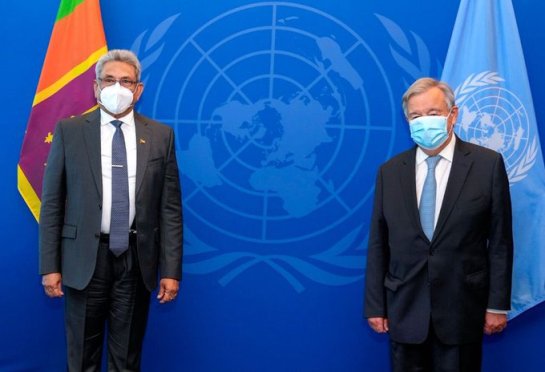Sri Lanka to work closely with UN, agrees to ‘pardon Tamil youth’

COLOMBO – President Gotabaya Rajapaksa has pledged to co-operate with the United Nations 15 months after warning that he may take the island out of the world body and its agencies if they pursued war crimes allegations against Colombo.
“President Rajapaksa said he was always ready to work closely with the United Nations,” his office said in a two-page statement even as the UN’s Human Rights Council (UNHRC) in Geneva announced last week that it collected some 120,000 pieces of evidence of abuses by Sri Lankan forces.
In his first face-to-face meeting with UN Secretary-General António Guterres in New York on Sunday (19), the Sri Lankan president pledged he would take “immediate action” to address the issue of missing persons, a long-standing concern of the international community.
“The President informed the Secretary-General that the government would take immediate action with regard to missing persons and expedite the efforts such as issuance of death certificates.”
In a brief one-paragraph statement issued after the bilateral meeting in New York, the Secretary-General stressed the “importance of ensuring the protection of minority rights and civic engagement.”
The media statement from the President’s office said Guterres has told the President the UN will provide its full support to Sri Lanka in moving forward to promote unity among different communities.
Diplomatic sources said the UN chief’s message was a clear reference to depriving Muslims of their burial rights during the pandemic, the targeting of minorities and civil society organizations.
Rajapaksa’s reported remarks appear aimed at the broader international community and was in contrast to his approach soon after winning the November 2019 presidential election.
“If any international body or organization continuously target our country and our war heroes, using baseless allegations, I will also not hesitate to withdraw Sri Lanka from such bodies or organizations,” the president had said in May last year.
With his second year in office approaching and the country facing a severe economic crisis, his administration appears to have softened its stand towards Western nations and international organizations.
The government has welcomed a European Union delegation due to arrive in Colombo on September 27 to examine whether to end the GSP Plus tariff concession over allegations of rights abuses. Earlier, Sri Lanka had resisted any foreign moves to scrutinize its rights record.
In his talks with the UN chief, Rajapaksa, a member of the majority Sinhala-Buddhist community, had also taken a conciliatory tone about minority Tamils saying he is willing to invite the “Tamil Diaspora” to discuss ethnic reconciliation, but maintained that internal issues of Sri Lanka should be resolved through an internal mechanism of the country.
He had also expressed willingness to grant pardons to Tamil youth in detention for long periods without being charged.
“The President informed the Secretary-General that… he would not hesitate to grant a presidential pardon to the Tamil youths who have been in custody for a long time, taking into account their long-term detention and after the legal process was completed.”
Rajapaksa was the top defence official under his president brother Mahinda when Tamil Tiger separatists were crushed in a military campaign that ended in May 2009.
Tamil political parties say 78 Tamils are still in custody, some for over 30 years, without being charged while the next of kin have also complained of thousands who have disappeared during and after the war. Some 16 Tamil rebel convicts were recently released under a presidential amnesty as they were about to complete their sentences.
-economynext.com

